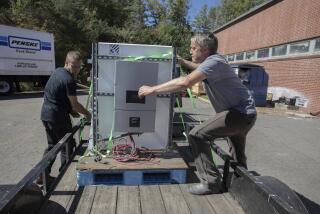Outage, Strike Almost Douse Flame of Life
- Share via
For most people, a power outage means inconvenience: food rotting in the refrigerator or an electric garage door failing to open.
For Northridge resident Lee Waters, an outage in his neighborhood in the early minutes of Wednesday morning--compounded by a strike by Department of Water and Power workers--meant a frantic race against time to save his wife’s life.
Elizabeth Waters, who has been in a coma for two years, is dependent on electronic life-support equipment and can survive only a limited time on backup oxygen. Her husband’s search for the power to keep her alive included numerous frustrating calls to the DWP and a confrontation with striking workers on a picket line.
By late afternoon, Waters had obtained two emergency generators from private sources to keep the lifeline going and had even received help along the way from strikers. But his odyssey convinced him that the department he relies on for life-giving electricity needs to take more responsibility for handling emergencies.
“It’s been a nightmare,” Waters said. “Maybe this will get some people to take action.”
Elizabeth Waters, 72, was diagnosed with Parkinson’s disease in 1983. She went into a coma two years ago after surgery. Her husband, also 72, decided to keep her alive on life-support equipment.
“I don’t have the guts to pull the plug,” he said.
The equipment pumps oxygen into her trachea and keeps it moist. Another machine sucks out fluids that collect in her trachea. She cannot go longer than two hours without oxygen or three hours without suction.
All the machines are electrically powered. So when the lights went out in his neighborhood as he was watching television early Wednesday, Waters, who also employs a full-time live-in nurse, sprang into action. He fed his wife oxygen from small tanks and then called the DWP.
Operators there, he said, told him they had no idea when power would be restored.
According to DWP spokesman Ed Freudenburg, the outage caused by a technical malfunction affected about 840 homes in the area around Louise and Plummer streets.
Waters thought he was covered for such emergencies. He had applied to the DWP, about a year ago, to be eligible for priority assistance in a life-threatening situation. It was his understanding that the department would provide a generator if necessary.
But a DWP operator he spoke to about 12:45 a.m. could not access the computer to confirm he was on the list. She told him to call the service department seven hours later.
Waters made a call to Holy Cross Medical Center for a generator but came up empty. Then he turned to his son, Bill, who owns a generator. Bill Waters, a resident of Simi Valley, got out of bed and raced to Northridge.
By 2 a.m. they had the generator operating the humidifier that moistens the oxygen. But they had to disconnect it periodically and use it as the suction apparatus. The process was labor-intensive, and they still didn’t have enough power to operate the oxygen compressor, which would be needed when the tanks were empty.
At about 8 a.m. he called the DWP service department but was told his name was not on the priority assistance list.
Finally, at about 2:30 p.m., with the power still off, he set off to pick up another generator from a gardener at his country club. On the way, he spotted a management-staffed DWP service crew working near the intersection of Plummer and Louise. He stopped to talk with them when a group of half a dozen pickets, who had been arguing with the management crew, approached him. Only then did he realize there was a strike.
“I was so damn mad” with the strikers, he recalled. “I said, ‘What’s the matter with you guys? I’ve got a lady on life-support. You guys are annoying the guys who could save her life.’ ”
He picked up the gardener’s generator only to have another--less confrontational--encounter with the picketers when he returned home.
As he unloaded the machine from his car, the strikers approached him and asked if he needed any help. Together, they carried the machine into the home and installed it in his back yard.
“They were a great help,” said Mrs. Martinez, the live-in nurse, who did not want her first name used.
But Waters’ odyssey was not over. “Now I have to start looking for a bigger generator that will give me the power I need in case this thing keeps going.”
Times staff writer Timothy Williams contributed to this story.
More to Read
Sign up for Essential California
The most important California stories and recommendations in your inbox every morning.
You may occasionally receive promotional content from the Los Angeles Times.










